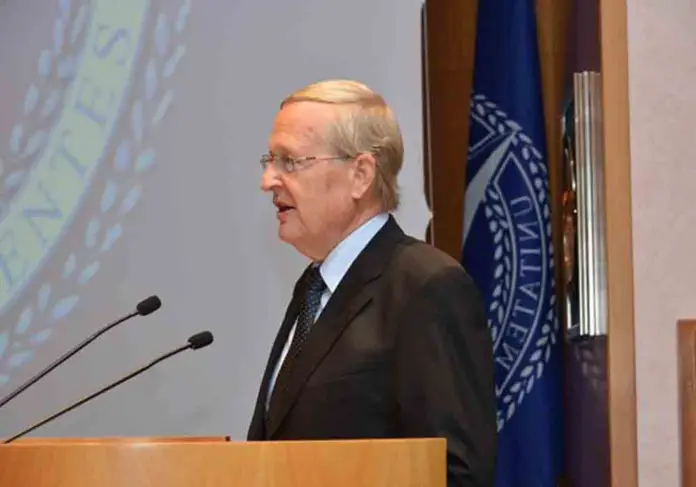“That is a great question,” replied the former German ambassador to Pakistan Dr Gunter Mulack to my question as he concluded his address as guest speaker to a training course of which I was a part of at one of the premier institutes of the country in 2006. The stage was his, owing not only to his diplomatic status, but also due to the fact that he had a doctorate degree in Islamic Studies. Being from the foreign service cadre of Germany’s bureaucracy, Dr Mulack had served for 22 years in the Middle East. His interest in Islam, therefore was probably a consequence of his tour of duties. His command over Arabic and frequent references to the Holy Quran with effortless ease manifested his prowess, so very befitting to his credentials.
While expressing his views on his topic “Islam and the West” he alluded to issues which one can enlist under a punchline “Contemporary challenges to Islam”. Issues, like radicalism and extremism, woman empowerment and difference between Islamic and western way of life, roles of religious seminaries vis-a-vis modern ethos of education all were deliberated upon by Dr Mulack. A bewilderment, a discord was ensuing and undercurrents of the same were sweeping through the audience, including myself. The more was spoken, more evident it became what was being circumvented and why so, may be on purpose. Will come back to this through a link up in succeeding lines.
Humans have historically expressed themselves through a use of visual and acoustic signals in history. Then came the writings and drawings, classified by archeologists as pictograms and inscriptions, with stones and clay as media. Greeks, Romans, Persian and Arabs all were good at use of vocals as ready form of expression through all ages. They were heard in courts and legislative assemblies, market places and battle grounds, in a bid to persuade the audience; “rhetoric” to be exact.
Another countryman of his, Johannes Gutenberg, invented the first movable printing press in 1440, ‘Gutenberg’s Bible’ ten years later is believed to be the first major printed book in Europe, however, it was in 1605 that the first newspaper was printed. The printing technology unleashed an unprecedented power to ‘rhetoric’. Effectively being used, ever since, to form, mold, make and break opinions.
With the difference of opinion came in vested interests and hence the negative side of expression through written or verbal content, known as ‘libel’ and ‘slander’. Libel is a published statement damaging the repute of somebody, and slander is doing the same verbally. Both are offenses and can be taken to the court for defamation even in this modern era of personal liberties. Rhetoric has been categorized into three strategies by Aristotle, ethos (when source is credible and speaker commands authority over the subject), logos (when audience has to use of logic and deduction to gauge the strength of argument), pathos (use of emotional appeal to gain audience’s acceptance). Readers and writers stand as equivalents of audience and speakers, respectively.
Dr Guntar Mulack was at his rhetoric best, he was treading the stage exuding command over his subject (ethos), was looking straight into the audience because of logics he was giving out in support (logos) and very magnanimously alluding to contribution of Islam to world (pathos), understanding that his audience was predominantly Muslim. But, what turned the tide was the confluence of his subject with the western darling of ‘freedom of expression’. He repeatedly referred it to be one of the basic human rights endorsed by the United Nations (UN) Charter and organizations like Amnesty International. He went to great lengths, enlightening us on this freedom, which to me is of significance, but is not an item on my list of ‘No Holds Barred’. To us there are some lines not to be crossed when it comes to faith, sanctity of our Prophet Hazrat Muhammad (PBUH), the country and the family.
Logic agitates the mind on this uncontrolled freedom, to be viewed in the context of modern day war on blasphemy. Those were the days in 2006 when publishing of caricatures had already unleashed a wave of very strong dissent and rage in the Muslim world. Basic logic dictates, that if a person is no more in this world to answer back the derogation unleashed on him, does it mean defamation has not taken place? Why the difference in implication of defamation? Why it is only related to presence of the defamed person in this world? Why it is not applicable even after he has left this mortal world? Why not the society can take onus to represent the departed one? It was unending train of thoughts racing through my mind. I found it to be my obligation to at least question, which I did in Q&A Session.
I raised my hand and when allowed to speak said “Thank you your excellency for an enlightening talk, if I may ask your take on bar on freedom of expression on certain issues in the west too, considered a taboo to talk on”. The answer was a big “No”, “freedom of expression is a corner stone to our societies”. I was like “Will you like to make it more contemporary considering the need of harmony with the Muslim world, just like you advised us on Islam, let us hear you talking on holocaust, if not, then ban the publishing of blasphemous material too”. That is when he stood still for a moment, fingers of both hands clasped together, one thumb rolling over the other and said “That’s a great question, some other time” and then addressed the chair “thank you for having me over”. No wonder freedom of expression is a ‘great question’, answer to which is yet to be defined.






